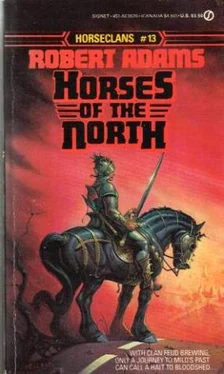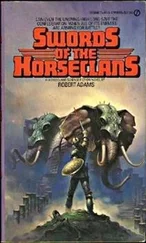So, thinking thoughts of ultimate power and revenge for all real or imagined wrongs done him in his lifetime, Grant MacEvedy trudged on to his appointment with destiny.
The quadrangle of the fort was become an open-air smithy and wagon-building yard, wherein the Clan Ohlsuhn smiths—they being traditionally the best practitioners of the art in Milo’s tribe—and the smiths of the Scott tribe labored on as they now had for long weeks at turning archaic steel scrap into useful hardware with the willing assistance of the smiths from fort and station.
In the area near the wide-opened main gate and outside, beyond it, the gathered lumber had been piled, and men scurried like ants around and over those piles, busy with measuring instruments and tools—cutting boards into fellies, turning dowels and then shaving them down for tapered spokes, assembling running gear, bending wood for ox yokes and tying it into its new shape with wet rawhide strips and then hanging it within the heat radius of the ever-glowing forge fires in the quadrangle to set and season.
But carts were not the only uses of the lumber. Thinner, lighter laths were being turned into lattices to make up the sides of yurts, the joints each joined with treenails. Shorter but wider and thicker pieces became doorframes and center wheels, slotted to take the roof supports, the lower ends of which dovetailed into the side-bracing timbers.
Inside a building that had once been a stable, its box stalls now gone for lumber, nomad women of Milo’s tribe worked at and instructed the women and girls of the Scott tribe and of the fort and station in the proper making, fullering and hardening of Horseclans felt to cover the yurt frames that the men were constructing. Of course, there would not be nearly enough of the new felt for a long while yet to come, but the generous nomads would share of their own with the newcomers, and the available canvas from tents would be used, layered under and over the felt, along with green hides, worn-down carpets and whatever else turned up to temporarily plug the gaps.
Other women and girls thronged the nomad camps, avidly absorbing the teachings of their new role models in the arcane arts of properly managing a nomad household. An old, wrinkled woman of Clan Krooguh was teaching identification of roots and tubers and leaves and flowers of wild plants relished by the folk of the clans. Another, much younger, woman was instructing a group of younger, stronger young women in use of the stock whip and ox goad; as she spoke, she likened various of her actions to saber strokes and promised to teach the use of that weapon to any interested females, later on, on the march.
Within the fort itself, Colonel Lindsay and some of his officers, helped by Milo, who sympathized and agreed with the commander in many ways, had just finished stowing the last of the books and records of the battalion and its fort in stout copper- and brass-hooped casks, waterproofing them with tar and safely stowing them in a secret space behind a false wall of the strongroom. The colonel had agonized for days in drafting a letter to accompany those records, and he now felt that he had offered the best reasons of which he could think for ordering the desertion of the station, the post to which the last legal government of Canada had assigned the original battalion, then commanded by his ancestor, the first Colonel Lindsay of the 228th Battalion (Reinforced) to guard MacEvedy Experimental Agricultural Station and its government-sponsored research.
The metal sheathing of the strongroom’s outer door had long ago gone for body armor, and that double-thick oaken door itself had more recently gone, with its massive frame, to provide the boards for strong fellies for the carts. But the records still were as secure as possible under the circumstances, for with the pivoted section of wall eased back into place and securely latched, the chamber looked to the uninitiated like simply another empty stonewalled room, stripped now like all of the others of furnishings, carpets and all of its wood paneling.
When he rounded the chapel to see only the barest trace of smoke—no more than what could be expected to emanate from a banked fire—arising from the parsonage chimney, Gerald Falconer’s righteous wrath, never far beneath the surface anyway, began to arise. A man could not be expected to attempt or accomplish God’s work on an empty stomach, and he had issued unmistakably clear orders to Jane that she have a hot meal ready for him in an hour’s time, something that would have required the addition of more wood to the stove fire at the very least.
The front door gaped open, and this, too, annoyed him. “Wife!” he roared, in the growling tone that denoted his vilest rage. But there came no answer of any sort, not even the expected whimpering of one of the younger children, who could recognize the tone of his wrath and had felt his kicks and cuffs often enough to fear him when he chanced to be in such a degree of anger and ill-controlled violence toward anything that moved or made a noise.
He searched the parsonage from low attic to root cellar, then opened and entered the semiattached privy, storage shed and stable, but there was no trace of Jane or of the little children. He then searched again, and it was in the course of this second vain search that he noticed the facts of missing clothing items and certain familiar objects from kitchen and cupboard; moveover, the big, capacious wheelbarrow was gone from its designated place against the back wall of the shed. Then the light of knowledge dawned in his narrow mind like the sudden blaze of sunlight emerging from behind dark clouds: his wife, his own wife, given into his service by God Almighty, had taken his children—the blessed fruit of his loins—and with them left his bed and board, deserted him and the Lord for the camp of his nemesis, following in the wake of the backsliding, heretical daughter who had earlier had the effrontery to desert him and the Church and God.
“Well, we will just see about that matter!” he snarled to himself, from between gritted teeth. His stomach agrowl, the Reverend Gerald Falconer stalked off toward the nomad camps, whitefaced in his anger, a two-foot billet of firewood clamped in his hand, resolved to have his wife and domestic slave back even if he had to beat her into insensibility to accomplish his holy purpose. When she came to her senses and fully realized the perdition from which he had saved her immortal soul, she would most abjectly thank him, of that he was more than certain.
At the edge of the nomad camp, an elderly, silvery-jowled and near-toothless hound approached him, its motheaten old tail waggling a greeting. Without breaking his firm stride, Gerald Falconer raised his cudgel and brought it down with such force as to crush the friendly animal’s skull and simultaneously snap its neck like a dry twig. He felt much the better for the act as he proceeded on into the camp, threading a way between the haphazard arrangement of openwork wooden-walled and felt-roofed tentlike things in which the heathen lived out their lives of utter damnation.
Deep into the camp, a semicircle of women and girls from fort and station modestly sat or immodestly squatted watching while a trio of nomad women—recognizable by hair first braided, then lapped across their pates, as well as by their terribly unchaste men’s clothing—fitted a yoke to a huge but gentle pair of oxen, then expertly attached the stout lines that hitched the device and the animals to a high-wheeled cart.
Falconer’s keen brown eyes picked out his errant wife’s mahogany-hued hair from a distance, and he stepped around and over the two rearmost ranks of women and girls until he stood just behind the rapt Jane Falconer. Stooping, the parson grasped a handful of that thick hair, hauled her over onto her back and wordlessly commenced to belabor the shrieking woman with the wooden billet still tacky with dog blood, even as he slowly backed from out the aggregation of females, dragging her with him.
Читать дальше












